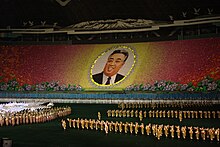This article has multiple issues. Please help improve it or discuss these issues on the talk page. (Learn how and when to remove these messages)
|


Mass games, or mass gymnastics, are a form of performing arts or gymnastics in which large numbers of performers take part in a highly regimented performance that emphasizes group dynamics rather than individual prowess.
North Korea



Mass games, such as the Arirang Mass Games, are performed annually in North Korea, at the Rungrado May Day Stadium, to celebrate national holidays such as the birthdays of former rulers Kim Il-sung and Kim Jong-il. In the 1990s, they were also held at the Kim Il-sung Stadium and the Pyongyang Gymnasium. North Korean mass games typically feature over 100,000 participants in a 90-minute display of gymnastics, dance, acrobatics, and dramatic performance, accompanied by music and other effects, all wrapped in a highly politicized package.
Per Kim Jong-il:
Developing mass gymnastics is important in training schoolchildren to be fully developed communist people. To be a fully developed communist man, one must acquire a revolutionary ideology, the knowledge of many fields, rich cultural attainments and a healthy and strong physique. These are the basic qualities required of a man of the communist type. Mass gymnastics play an important role in training schoolchildren to acquire these communist qualities. Mass gymnastics foster particularly healthy and strong physiques, a high degree of organization, discipline and collectivism in schoolchildren. The schoolchildren, conscious that a single slip in their action may spoil their mass gymnastic performance, make every effort to subordinate all their thoughts and actions to the collective.
— Kim Jong-il, On Further Developing Mass Gymnastics: Talk to mass Gymnastics Producers. April 11th 1987
Mass gymnastics exhibit the North Korean idea of ilsim-dangyeol (single-minded unity) as well as nationalism.
The 2004 British documentary film A State of Mind follows two child gymnasts training for the mass games in Pyongyang.
Outside North Korea
Guyana
Guyana, under Forbes Burnham (1964–1985), held mass games in February 1980, to celebrate the nation's ten-year anniversary.
Europe
| This section needs additional citations for verification. Please help improve this article by adding citations to reliable sources in this section. Unsourced material may be challenged and removed. Find sources: "Mass games" – news · newspapers · books · scholar · JSTOR (December 2024) (Learn how and when to remove this message) |

Germany
In Germany, Friedrich Ludwig Jahn developed a gymnastics method called Massenturnen. In 1860, in a bid to promote the sport, he initiated the Massenturnen festival [de]. The festival continues to be held to this day, in the form of an international gymnastics event.
In East Germany, eight mass games, called the GDR Gymnastics and Sports Festival, were held in Leipzig. Participation was voluntary, and the segments combined both Western and Eastern elements, infused with German traditions.
Czechoslovakia/Czechia
Mass games developed in Czechoslovakia as part of the Sokol movement, a gymnastics organization that organizes the Slet [cs] event. The word slet means "festival", or "gathering of birds". The first Slet was held in 1882 in Prague to celebrate the 20th anniversary of the organization's founding. Since 1994, Slets have been held every six years, with the most recent one having taken place in June 2024.
Czechoslovakia also organized the Spartakiad, a mass gymnastics event meant to celebrate the country's liberation by the Soviet Red Army in 1945.. The event was held regularly between 1955 and 1990.
Yugoslavia
In Yugoslavia, similar activities, also called Slet, were organized, and one of these was the Relay of Youth; participation in the events was voluntary.
Romania

In Romania, the communist government organized compulsory mass games after General Secretary Nicolae Ceauşescu and his wife had visited the People's Republic of China and witnessed the event there.
See also
References
- Kim Jong-il (1987). On Further Developing Mass Gymnastics: Talk to Mass Gymnastics Producers April 11, 1987 (PDF). Pyongyang: Foreign Languages Publishing House. p. 1.
- Young, Benjamin R. (2020). "Cultural Diplomacy with North Korean Characteristics: Pyongyang's Exportation of the Mass Games to the Third World, 1972–1996". The International History Review. 42 (3): 543–555. doi:10.1080/07075332.2019.1609545. ISSN 0707-5332. S2CID 164424248.
- Burnett, Lisa (2013). "Let Morning Shine over Pyongyang: The Future-Oriented Nationalism of North Korea's Arirang Mass Games". Asian Music. 44 (1): 3–32. doi:10.1353/amu.2013.0010. ISSN 1553-5630. S2CID 191491691.
- "A North Korean state of mind". asiasociety.org. Retrieved 30 December 2024.
- "'Only a disciplined people can build a nation': North Korean Mass Games and Third Worldism in Guyana, 1980-1992 | the Asia-Pacific Journal: Japan Focus". 26 January 2015.
- "History". SOKOL USA CHICAGO GYMNASTICS. Archived from the original on 10 September 2012. Retrieved 22 December 2008.
- Bednar, Charles and Sivak, Paul: The Sokols and Their Endeavor. 1948.
- Morkes, František (18 December 2005). "Jak vzniklo slovo "spartakiáda"" [How did the word "spartakiáda" originate?]. Czech Radio (in Czech). Retrieved 30 December 2024.
- Bojana Ceveljić and Ana Vujanović (5 December 2012). "Public Sphere by Performance". Katarina Popovic. p. 69. Retrieved 5 July 2012.
Further reading
- Song Mo Kim; Song Il Thak; Chol Man Kim (2002). Mass Gymnastics in Korea. Pyongyang: Foreign Languages Publishing House. OCLC 499981837.
External links
- Images
- Videos